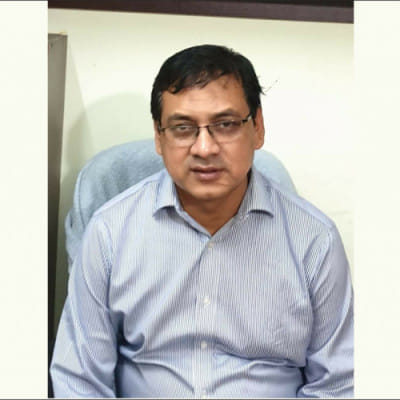In Memoriam: A Comrade Fallen

It often takes the life of one man for a nation to wake up or to gather the courage to call a spade a spade.
Dr Md Moyeen Uddin, an assistant professor at the Department of Medicine of Sylhet MAG Osmani Medical College, a colleague, a friend, beloved to all who knew him, passed away on Wednesday. I don't want go into the details about the circumstances of his death, so let me just say that we all grieve in different ways—there are those of us who knew him well, those not so well, and then there were those who got the feeling of knowing him through the reports of the print/electronic media.
I got to know Dr Md Moyeen Uddin through my husband, when they were both studying for their postgraduate exams. Tucked away in the reading room of the DMCH library, they would both be there studying along with some others.
With time, everyone went their own way, but the few times we went to Sylhet, we did drop in on him in his chamber. Once we went on a family trip with our parents and he and his family hosted a river-cruising dinner for us on the Surma River. Our children got on well, playing together. And now when I tell my son to observe a special prayer for an uncle who has just passed away, he quizzes me, "don't you remember, this uncle came to our house, and Abbu reminded me that he was the boat uncle!" Children remember things when you least expect them to. I'm certain there are many more people out there who have a treasure of memories to share about Dr Moyeen.
All will agree on the fact that he was a rare gem of a person, polite and modest. But will his death go in vain?
Since the outbreak of the Covid-19, and with the measures being put in place in Bangladesh, my husband and I (like many other doctor couples) discussed what would we do if either of us got infected with the virus. We discussed quarantine and isolation measures, how to examine patients and so forth. We even touched lightly, in our weakest moments, on the topic of succumbing to the virus.
It must be acknowledged that the doctors are doing a tremendous job at the moment despite various limitations, especially those in the hospitals/labs designated as Covid-19 centres. All doctors, whether in the public sector or private, are doing their best to carry out their practices defying risks and odds.
We doctors have had a lot of negative media coverage in the past, and until recently, the general public had more or less the same impression too. But when nearly the whole world is in lockdown, with the privileged finally robbed of their luxury of escaping to some "highly developed" medical centre overseas for a "full body check-up", do they now regret that our own medical system is not up to par?
In all these years, with all the medical experts that we have grown both at home and abroad, could we not have improved our own healthcare sector?
Could we not have put our egos and political differences aside, and followed the advice of the experts and professors who, time and again, stressed on the importance of building our own capacity?
Could we not have developed a good emergency service delivery system in all government and private hospitals to properly triage patients as they come in?
Could we not have utilised the experience of experts in the field of emergency?
Could we not have invested more in the health sector so that government hospitals in all the districts of Bangladesh could have the same level of experts and logistics at hand, so that no critical patient would have to waste valuable time in the transport?
Could we not have used the funds and resources that come to us from home and abroad to procure and ensure proper utilisation of medical equipment instead of leaving them to rust and rot in some godforsaken place?
Could we not have ensured that the condition of private medical college hospitals was improved to an extent that their services would be on a par with the best government hospitals?
Do I write out of anger, out of despair? No, I write because my sense of mortality is actually staring at me in the face. What I should have written in the past to address these points is no longer valid now. At home, we have elderly parents and young children. The constant worry about what will happen to us all is now no longer a new issue. It's our daily reality. It's the air we breathe. Any one of us may die tomorrow, and the coronavirus is not the only reason we may die. And so we, doctors, will have to continue to look after our own safety and go to our hospitals and chambers to fulfil our duties. We will all have to justify our actions to our Creator when the time comes. Just as the doctors who go to hospitals and their chambers to help their patients with or without adequate safety measures, they can hold their heads high and say, "I stuck to my sworn oath", the same way bureaucrats, politicians and the media personnel and even the general patients might take a moment now to think, "what shall I say when I meet my Creator?"
Let the death of our fellow comrade not go in vain.
Dr Sonia Nasreen Ahmad is an Assistant Professor of Medicine at the Holy Family Red Crescent Medical College and a director at Dr Nizam Medical Center.

 For all latest news, follow The Daily Star's Google News channel.
For all latest news, follow The Daily Star's Google News channel. 



Comments